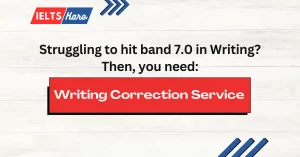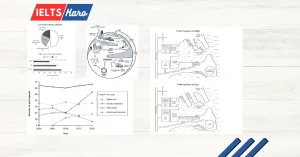IELTS Writing Section Overview
How many words should I write for Task 1 and Task 2 in IELTS Video Link:
I get this question a LOT of times. So why not a video and a blog on it?
The IELTS Writing section is divided into two tasks: Task 1 and Task 2. You must write no less than 150 words for Task 1 Writing, and no less than 250 words for Task 2 Writing. No exceptions here. It breaks my heart to see students writing exceptionally well, only to find out they wrote 149 words for Task 1 and 249 words for Task 2. IELTS has zero flexibility on this.
Let’s discuss this in more detail.
Types of Tasks
- Task 1 (Academic): You have to describe visual information such as graphs, charts, diagrams, maps or processes.
- Task 1 (General Training): You have to write a letter based on a given situation, which could be formal, semi-formal or informal.
- Task 2: You have to write an essay in response to a point of view, argument, or problem. This task is the same for both Academic and General Training versions of the IELTS.
Word Requirements for IELTS Writing Tasks
Task 1: Academic and General Training
For Task 1, whether you are taking the Academic or General Training version, you are required to write at least 150 words. It’s essential to meet this minimum word count to avoid penalties. Writing anything less than 150 words will result in a lower score because you won’t be able to fulfill the “Task Achievement” criteria of the exam. Task 1 carries 33% of the grading weight.
Task 2: Academic and General Training
For Task 2, you must write at least 250 words. This task carries more weight in terms of scoring, so it’s crucial to develop your ideas thoroughly. Writing fewer than 250 words will also lead to a reduction in your score, while writing more is generally acceptable, provided the essay is well-organized and focused on the topic. Task 2 carries 67% of the grading weight.
Why Word Count in IELTS Matters?
Adherence to Instructions
Meeting the word count requirements demonstrates your ability to follow instructions, which is an important aspect of the exam. Examiners expect candidates to adhere to the given guidelines, and failing to do so will negatively impact your score.
Impact on Scores
The IELTS writing tasks are assessed based on several criteria, including task achievement, coherence and cohesion, lexical resource, and grammatical range and accuracy. Not meeting the word count will affect your performance in these areas, particularly in task achievement and coherence.
A well-written Writing Task 1 and 2 could qualify for an 8 band, and just because a student wrote less than the minimum word count, will drop the overall band score to less than 7.
Strategies to Meet the Word Requirements
Planning Your Essay
Before you start writing, take a few minutes to plan your essay. Outline your main points and supporting details. This will help you stay on track and ensure that you cover all necessary aspects within the required word count.
Time Management
Allocate your time wisely between Task 1 and Task 2. It’s recommended to spend about 20 minutes on Task 1 and 40 minutes on Task 2. Keeping an eye at the clock will help you avoid spending too much time on one task and not having enough time for the other.
Developing Ideas
To meet the word count, make sure you develop your ideas fully. Provide examples, explanations, and details to support your points. This not only helps in reaching the required word count but also improves the quality of your writing.
Common Challenges and Solutions
Writing Too Few Words
One of the biggest challenges students face is writing too few words. Many so-called IELTS experts state that it is “OK to write below the word count.” NO, it is NOT OKAY. This is a bad advice and whoever says this has absolutely NO way how IELTS writing marking works!
To avoid this, make sure you have enough points to discuss. If you find yourself running out of ideas, try to think of different perspectives or additional examples related to the topic.
Writing Too Many Words
This is just as dangerous as the previous advice. You are NOT supposed to write far more than the required word count limit. Here are a few reasons why:
- You only get 60 minutes for both tasks. Writing more than the required word limit will leave you no room to go back, edit and proofread what you have written.
- Writing more does not equate to better marks. The more you write, the higher the chances of making grammatical and spelling mistakes.
- Your writing will be marked based on how well you have answered the question, which means it is quality that the IELTS examiners focus on, NOT the quantity.
While it’s generally acceptable to write a little more than the required word count, writing significantly more can lead to irrelevant content and lack of focus. Be concise and stay on topic to avoid this issue.
Then How Many Words Should I Write?
Ah! Good question! Aim for no more than than 200 words in Task 1, and less than 300 words in Task 2 and you should be doing good. Anything more than this, and you are likely to score less due to mistakes.
In my IELTS (I have an 8.5 in Writing ;)) I wrote about 290 words for Task 2, and around 180 words for Task 1. This is what I consider an IDEAL word count.
Are All Words Counted the Same Way?
No, they aren’t. Words such as “amazing” is counted as 1. However other words that are hyphenated such as “world-class”, or “state-of-the-art” are also counted as 1 word. Any contractions such as “I’ll”, “You’ll”, “We’ll”, is also counted as a single word.
Punctuations such as comma, fullstop, etc. are NOT counted as words.
Maintaining Coherence and Cohesion
Ensuring that your writing is coherent and well-organized is crucial. Use paragraphs to separate different points, and use linking words and phrases to connect your ideas smoothly.
Tips for Effective Writing
Structuring Your Task 1 and Task 2
A clear structure is essential for a high-scoring writing. For Task 1, include an introduction, an overview, and detailed paragraphs describing the main features. For Task 2, follow a structure with an introduction, body paragraphs, and a conclusion.
Using a Range of Vocabulary
Demonstrate your vocabulary range by using varied and precise words. Avoid repeating the same words and phrases. Instead, use synonyms and paraphrasing to enhance your lexical resource score.
Checking Grammar and Spelling
Errors in grammar and spelling can affect your score. Take a few minutes to proofread your essay and correct any mistakes. This will help you achieve a higher score in grammatical range and accuracy.
Practice and Preparation
Importance of Regular Practice
Regular practice is key to improving your writing skills. Write essays on different topics and get familiar with the types of tasks you’ll encounter in the exam.
Using Sample Questions
Practice with sample questions to get a feel for the exam format and the types of prompts you’ll be given. This will help you develop strategies for approaching different kinds of tasks.
Getting Feedback
Seek feedback on your writing from teachers, tutors, or peers. Constructive feedback can help you identify areas for improvement and refine your writing skills.
Resources for IELTS Writing Preparation
Books and Guides
There are many books and guides available that provide tips, strategies, and practice questions for the IELTS Writing section. Only follow the official sources such as “The Official Cambridge Guide to IELTS“, British Council, and the IDP website.
Practice Tests
Regularly take practice tests to assess your progress and identify areas where you need improvement. Timed practice tests will also help you manage your time more effectively during the actual exam.
Conclusion
Understanding and meeting the word requirements for the IELTS Writing section is crucial for achieving a high score. By following the strategies and tips outlined in this guide, you can improve your writing skills and boost your confidence. Remember, regular practice and thorough preparation are the keys to success.
FAQs
What happens if I write less than the required word count?
If you write less than the required word count, you will receive a lower score for task achievement. It’s important to meet the minimum word count to demonstrate your ability to develop and organize your ideas effectively.
Can I write more than the required word count?
Yes, you can write more than the required word count. However, make sure that your writing remains relevant and concise. Avoid adding unnecessary information just to increase the word count. Remain below 180 words for Task 1 and below 290 words for Task 2.
How is the IELTS writing section scored?
The IELTS Writing section is scored based on four criteria: task achievement, coherence and cohesion, lexical resource, and grammatical range and accuracy. Each criterion contributes to your overall band score.
What are some common mistakes to avoid in the writing section?
Common mistakes include not meeting the word count, writing off-topic, poor organization, and grammatical errors. Practice regularly and seek feedback to avoid these mistakes.
How can I improve my writing skills for the IELTS exam?
Regular practice, using sample questions, getting feedback, and studying high-scoring sample essays can help improve your writing skills. Additionally, focus on expanding your vocabulary and improving your grammar.
Can I Repeat my Sentences and Words?
Off course, you CANNOT do that. Repeating the words and sentences in your writing will essentially make it meaningless and IELTS examiners are really smart to understand how students are tricking them into thinking more words. But words that are often repeated will also impact your band score. Use synonyms to avoid repetition.





